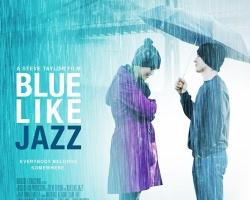Director: Steve Taylor
Starring Marshall Allman as Donald Miller; Claire Holt as Penny; Tania Raymonde as Lauryn; Justin Welborn as The Pope; Jason Marsden as Kenny; Jenny Littleton as Don’s Mom
Rating: PG-13
Faith is messy business. That’s a hard, uncomfortable truth for some; but that doesn’t make it any less true.
When the film Blue Like Jazz opens, protagonist Don Miller doesn’t quite understand that disturbing reality. Oh, don’t get me wrong: Don’s a pretty good Christian—a conscientious son, a leader for the youth group at his Baptist church, a worker-bee at a company that makes individually packaged communion cups. However, his faith’s been tested much. As his agnostic father tells him, “You only believe that stuff because you’re too afraid to hang out with those who don’t.”
Still, when Don suspects his mother is having an affair with the church youth pastor, he makes a radical decision: Instead of going to the safe, secure Baptist college he’d planned to attend, he heads to Portland’s Reed College, a prestigious liberal arts institution and one of the most secular campuses in the country. It’s a land of fake popes, lesbians and bumper stickers that say, “Abstinence makes the church grow fondlers.” Christians here are the minority—Christians who are shunned, mocked and scorned. “You probably want to keep that [your faith] quiet around here,” says Lauryn, Don’s lesbian friend. Don follows her advice so well that he nearly forgets he’s Christian.
Regardless of how far you run, you can’t shake God’s loving pursuit. In spite of Reed’s aggressive secularism, the hypocrisy of Don’s Christian support structure and Don’s own waywardness, God will not be denied.
Blue Like Jazz was inspired by Donald Miller’s bestselling book of the same name; but while the movie bears only a little resemblance to Miller’s essays, it captures the book’s spirit. Don, the main character, is a man deep in spiritual crisis—shedding the religion of his childhood like a snakeskin to find a new, more personal, more beautiful form of faith.
Miller, the author, has his share of critics—folks who believe the form of Christianity he espouses shunts theology in favor of a squishier, more relational form of spirituality. This film, if anything, will make some Christians more uncomfortable. Director Steve Taylor himself says Blue Like Jazz isn’t family friendly: Moviegoers will hear some harsh language, frank discussions of sexuality and see a woman use a urinal. More shocking perhaps is how disdainful some of Reed’s more outspoken students treat Christianity: God, Jesus and the whole Christian faith are mocked and derided.
In my opinion, all that derision makes the film even more powerful. While some Christian movies can feel more as paint-by-number or a pulpit-pounding sermon with moving pictures, Blue Like Jazz feels honest—honest to the art form of filmmaking; honest to Don’s story; and honest to the harsh, sometimes rocky journey of faith. This is a film for seekers kicking the tires of Christianity, for non-Christians open to a powerful new narrative and for Christians who don’t like Christian movies.
Sure, some won’t like Blue Like Jazz. Some will love it. Almost everyone will have a lot to think about after the credits roll.
Questions:
1. In the movie, Don Miller’s faith is shaken by the actions of his pious mother and youth pastor. Have you ever been disappointed by a Christian? Has that disappointment led to you question your own faith?
2. We see some people who are pretty critical of Christianity. Is some of that criticism warranted?
3. Blue Like Jazz tells us Christianity is better than we Christians sometimes make it look. When have you been a great ambassador for Christ? When have you fallen short?




